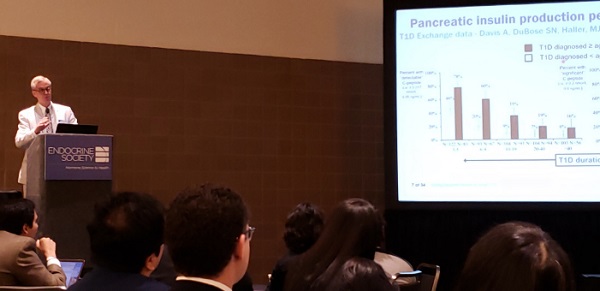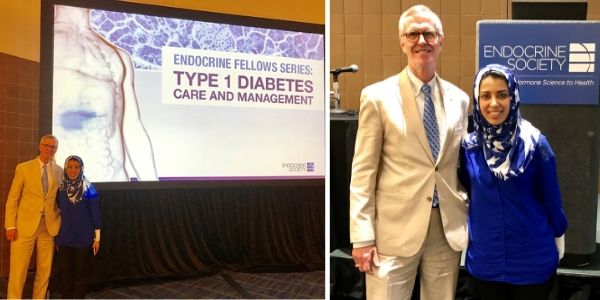Dr. David Harlan Presents "Going Beyond Insulin in Type 1 Diabetes" at the Endocrine Society's Fellows Conference
Date Posted: Saturday, June 22, 2019
UMass Diabetes Center of Excellence co-director David Harlan, MD, recently spoke at the Endocrine Society Fellows Series in New Orleans. The annual two-day conference educates adult and pediatric endocrine fellows worldwide, who are interested in type 1 diabetes (T1D) care and management. It provides the opportunity to learn from expert leaders in the field, through interactive group discussions, clinical case presentations, and networking sessions.
Attendees received comprehensive education not typically taught in fellowship. This year’s topics included individualized treatment strategies using new and emerging insulin and non-insulin therapies, as well as the ability to recognize and evaluate individuals with T1D for signs of depression and distress using updated guidelines and practice tools. Applying this updated knowledge of treatments, practice guidelines, and clinical skills, will help to improve long-term outcomes and sick day management.
"Going Beyond Insulin: Emerging Options for T1D"
Dr. Harlan presented options beyond insulin therapy for people living with diabetes, including GLP-1 and SGLT use. He urged the audience to think beyond simply classifying patients as either type 1 or type 2, instead proposing “question every patient that you see come in with a type 1 diabetes diagnosis” and recognize that physiology can and does vary significantly. He suggested that they think about the following for each individual in addition to the broad type 1 vs. type 2 classifications:
- Is the patient insulin deficient or experiencing residual pancreatic insulin production?
- Does the patient show evidence of anti-pancreatic islet autoimmunity?
- Is the patient overweight with insulin resistance?
- Are there special circumstances (pregnancy, nursing, renal insufficiency, chronic heart failure, etc.) that warrant consideration for individuals not doing well with diabetes management?
Avoiding classifying people as type 1 or type 2 diabetes
Dr. Harlan explained that he avoids documenting "type 1" or "type 2" diabetes in health records whenever possible – both for the purpose of providing better care and because “I don't want anybody telling me that I can’t use a specific type of therapy due to a type 1 vs. type 2 classification.”
He challenged the fellows in the room to examine the complexity of diabetes as a disease and to move past the framework of type 1 and type 2 classifications which may contribute to stigma and make it difficult to provide personalized patient care.
SGLT inhibitor use in certain individuals with type 1 diabetes
Dr. Harlan pointed out the cardioprotective effects that these agents have shown in people living with type 2 diabetes saying “SGLTs have taken the diabetes field by storm, so much so that cardiologists want to now start prescribing them.” He added, “I love these agents for my properly selected patients,” and mentioned that in his personal experience, people who take SGLT inhibitors immediately notice a time in range benefit, within one day. He did however emphasize the well-documented increased risk of diabetic ketoacidosis (DKA) observed with use of these agents. He made it clear that patient selection is key in reducing DKA risk, and insisted that “with properly motivated and selected patients, we can come up with an algorithm for them to carry with them every day, and these therapies can be very safe and effective.” He added that he prescribes SGLTs for “properly motivated and educated individuals.”
Reducing DKA when using SGLT inhibitors
Dr. Harlan advises anyone using SGLT inhibitors to check urine ketone levels every day. He prefers urine over blood ketone testing due to cost and convenience, both of which are important factors to consider when checking daily. Testing each day reminds people that they are taking “a potentially serious agent,” however there is no concrete evidence that daily ketone monitoring will prevent DKA.
GLP-1 for type 1 diabetes patients with detectable C-peptide levels
Dr. Harlan highlighted improvements in blood sugar levels, weight, and insulin dose associated with GLP-1 use, reviewing data from studies of liraglutide (the ADJUNCT ONE and ADJUNCT TWO) in people living with T1D. He considers prescribing GLP-1s to people with some residual pancreatic insulin production, based on data analysis that individuals with detectable C-peptide demonstrated improved treatment effect with liraglutide, particularly in terms of lowering A1c.

